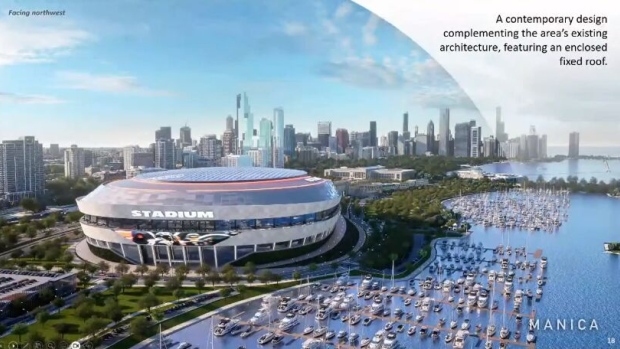Apr 24, 2024
Chicago Bears Unveil $4.7 Billion Stadium Project on Lakefront
, Bloomberg News

(Bloomberg) -- Chicago Bears officials alongside Mayor Brandon Johnson unveiled plans for a $4.7 billion project to build a publicly owned, enclosed stadium and enhanced lakefront area.
The proposal involves erecting a new stadium that would cost about $3.2 billion. The stadium will have a translucent roof and massive windows showcasing the Chicago skyline. The surrounding development includes more than a dozen acres of green space including athletic fields and public parks and phased-in infrastructure improvements to the lakefront campus.
The stadium proposal calls for a $2 billion investment from the Bears, with a $300 million loan from the National Football League and a $900 million debt sale from the Illinois Sports Facilities Authority, which collects a 2% tax on hotel stays.
“For any new development project at the lakefront, we required real private investment, real public use and real economic participation for the entire city,” Johnson said. “Today’s announcement delivers on all three.”
The project’s related infrastructure would be funded in stages, with $325 million initially required for transportation, roadways and utility improvements, according to the presentation from team officials. Phase two would include $510 million for parking, the expansion of the bus depot and new parks and athletic fields. An optional third stage would provide $665 million for further transit improvements, retail space and public attractions. Officials said they were exploring a range of funding options from state, local and federal officials.
“Now is the time to act,” said Karen Murphy, executive vice president for stadium development for the Bears. The cost of the project rises by more than $150 million every year it gets delayed partly because inflation, she estimated.
Johnson lauded the Bears’ $2 billion commitment to the project as one of the largest private investments in the city’s history. He said there will not be any new or raised taxes on Chicago residents. Kevin Warren, president of the Bears, said the team is seeking to be fiscally responsible in its plans, noting it opted for a fixed roof, instead of a retractable one given the cost.
The stadium would be designed by Manica Architecture, the firm behind Allegiant Stadium in Las Vegas and the new Nissan Stadium in Tennessee. Supporting 43,000 construction jobs, the project will be the largest building project in the region’s history, according to the Bear’s presentation. The team estimates the development will bring $8.4 billion in regional economic impact — though economists say such projections are often inflated.
Public Dollars for Pro Sports
The plan comes as public financing for professional sports stadiums faces skepticism from taxpayers in other cities. Earlier this month, Kansas City voters rejected a proposal to fund a downtown ballpark for their Major League Baseball franchise and pay for improvements to Arrowhead Stadium, home to their Super-Bowl-winning team, the Kansas City Chiefs.
While Chicago is known as a sports town, the nation’s third-largest city also has a history of shaky finances. The city’s pensions are short more than $35 billion after years of chronic underfunding, and more than 80% of property-tax dollars go toward retirement payouts.
Illinois has the worst credit rating among US states, with massive pension debts and a history of budget deficits, though its finances have steadied in recent years. Money for the stadium project will run up against other priorities.
Illinois Governor J.B. Pritzker has previously said public funding for stadiums isn’t a priority for his administration. Speaking at an unrelated event on Wednesday, Pritzker reiterated his reluctance to provide public dollars to finance a stadium even though he is a Bears fan.
“I remain skeptical about this proposal and I wonder whether it’s a good deal for the taxpayers,” he said. “The owners of these private businesses need to put a lot more forward in order to have their dreams fulfilled and not just rely upon the taxpayers of Illinois to make that happen for them.”
A spokesperson for Illinois House Speaker Chris Welch said while the speaker is happy to continue engaging in conversations with Chicago’s professional sports teams, “in the current legislative environment, with many important budget pressures, there hasn’t been a strong appetite for these projects.”
--With assistance from Randall Williams.
(Updates with context throughout including comments from Illinois governor.)
©2024 Bloomberg L.P.






